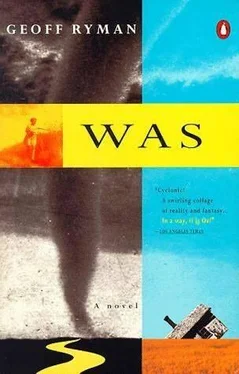They were in Oz. They all sang and danced together, kicking up leaves. They danced along the banks of a tiny branch of the Credit River. Tree roots overhung the bank. Underneath them were secret houses, full of Munchkins. They would come out to join the Oz people, singing "Ding Dong the Witch Is Dead." The singing went on amid showers of fallen leaves.
Then, one morning, Jonathan got up and saw that the world had turned white and that the air was full of falling flakes. The last time it had snowed had been nearly a quarter of his lifetime ago. He greeted winter like a friend he had not seen in decades. He ran out in ordinary shoes and flung handfuls of snow into the air. The sky was white.
He loved winter. In the dark, as he lay in bed in the mornings, there would be the comforting sound of the snowplows, rumbling past. His father would have to dig snow out of the driveway before he could leave for work. There would be sliding on the ice and toboggan rides. The inside of the living room windows was coated in great leafy patterns of frost. Jonathan and the Oz people sat at the breakfast table, wandering among them, in a forest of frost. As soon as breakfast was over, he would run outside.
Jonathan loved sunlight on snow, and he loved the mystery of ice. One day he and the people from Oz walked on the frozen surface of the ditches, imagining water babies shivering underneath the ice. The surface cracked and Jonathan fell in, soaking himself in ice water to the knees. He kept on walking, enchanted by the world he and his Oz friends walked through.
There were high billowing clouds. Cold made them seem solid, like icebergs in the air. Television had once told Jonathan that there were things in the air called Mushroom Clouds. People saw them and died.
Jonathan pretended that Corndale was under threat from advancing Mushroom Clouds. Jonathan was the only person who had a coat made of Jet-Age Plastic. He was protected, no harm could come to him. He walked to the gate of each house, walking on the crisp surface of the snow on his numb and frozen feet, pretending to warn them about Mushroom Clouds. He forgot about the cold.
There were canyons of ice overhead. White light swung around him like a sword. The people from Oz said that each sparkle of light on the snow was a fairy. The snow plains of Canada glittered with them, were spangled with laughing souls. If all the snow had taken to the air at once, with cries of joy, Jonathan would not have been surprised. He stood and looked at the snow, his trousers drenched, his feet and the water in his eyes ringing with cold.
When he got home, his feet were frostbitten. He howled as his toes were lowered into a basin of lukewarm water. There were sad, sick patches of gray on his skin. His mother wept. "Jonathan. Why didn't you come inside?"
She had to go to the store for ointment. Jonathan listened to the car murmuring out of the front drive.
Then he went to the new extension and took out a stepladder.
"Sssh!" he told the people from Oz. "This is the best." He climbed up the ladder and pulled himself into the attic.
It was cold inside the attic, with a single bare light and the smell of raw wood. The underside of the roof was coated in thick sandwiches of paper stuffed like mattresses. Some of it was wound up in rolls. Jonathan sat on them. There were wooden joists, and between them the back side of the plasterboards, still with writing on them.
"Careful," Jonathan warned the Oz people. "You can only stand on the boards." Fearful, grateful for his presence, the Oz people tiptoed toward him, balancing delicately.
He reached out for them. He was shivering and his feet were bandaged. He was not aware of what happened next. He must have slipped. Very suddenly, he was somersaulting through space. There was a lovely crisp sensation of breakage, as if falling through potato chips.
Then he was lying facedown, amid dust, bouncing slightly as if dropped by a cyclone.
He had fallen through the ceiling. He screamed in terror at the idea. By sheer chance he had fallen onto a roll of wire netting that was used to hold plaster to walls. There was blood.
Then he looked up and saw a rough and broken silhouette of himself punched through the smooth white surface of the ceiling. It was like Bugs Bunny running through a door.
When his mother got back, she arrived to hear peals of laughter. She went in the extension's front door and found Jonathan, bruised and bloody, looking up at the hole he had made and roaring with laughter.
"You fell through the ceiling?" she shouted. She couldn't believe it. "You fell through the ceiling?" Each time she shouted it, Jonathan laughed even louder.
His parents left him alone after that, for a while. His mother discovered that if he was left to do as he chose, he grew quieter and quieter, and more safely housebound. He no longer rocked in place, but he did sing to himself all the time, drawing layer on layer of colors on paper or making castles out of plasticine or sugar cubes that sparkled like snow. Sometimes he spoke to people who were not there.
He had never been happier.
Winter became spring, filling Jonathan with misgiving. Where there had been snow, there was mud, and on the branches of the pussy willows were buds that hung like centipedes. There was a thaw, and Jonathan peered out of the window down the Second Line West toward the schoolyard.
There lay his future, crowded with other children, more outgoing and physically larger than he. He could see them sunbathing, leaning against the white wooden walls of the schoolhouse, or sitting on the steps. He retreated from the window and went back into his room for his afternoon nap.
He imagined that he and his friends went to a circus. There were no fast or terrifying rides in this circus. There was a Ferris wheel, slow and gentle, and the Cowardly Lion was the most fearsome beast among the donkeys and sheep and friendly pigs. Even so, in this gentle circus, someone got hurt. Perhaps it is not possible to tell a story without someone being hurt, without a witch appearing.
The Scarecrow was wounded. Jonathan knew you were supposed to tell an adult as soon as a friend was hurt. He didn't want to tell anyone. He had never told his mother about his friends. If the Scarecrow really was hurt, then he had to. Why didn't he? Jonathan challenged himself. What was he afraid of? Jonathan steeled himself. Feeling fateful, he left his room and went to his mother.
"The Scarecrow caught his penis in a door, but Judy Garland kissed it better," he told her.
His mother was alarmed on several counts. "No, she did not," she said, not appreciating how truthful and dutiful he had been. "It's a lie, and I don't want to hear you talking like that again."
"But he did," protested Jonathan, in a voice that was almost too weak for even him to hear.
"You are going to go outside," said his mother, "and find some other children to play with."
Jonathan found Helen and Matty Quicke. They were sisters who lived two doors down. Helen was the same age as Jonathan. She had a floppy pageboy haircut and there always seemed to be a dirty stain of orange juice around her mouth. Her nose was always running. It was always running, Jonathan's mother said, because her parents didn't feed her properly.
Helen's elder sister Matty took care of both her and Jonathan. She liked to boss people, which meant that if Helen and Jonathan started to argue, she would stop the fight and make a decision. The great thing about the girls was that they understood the point of playing pretend. The point was to believe, not to win. The girls made up rules and stuck to them.
They played House. Jonathan always played Father-they needed a boy for that. They went through elaborate rituals of cooking meals and washing up and taking care of babies and fixing cars. It was so much like real life, that each one knew what to do, except that Jonathan had two wives.
Читать дальше












